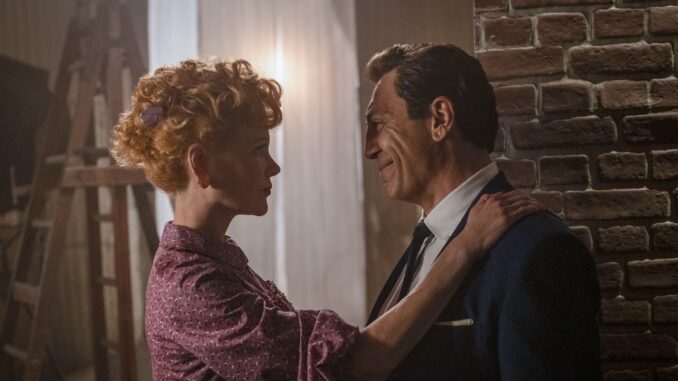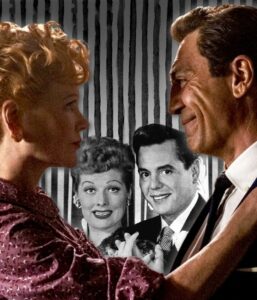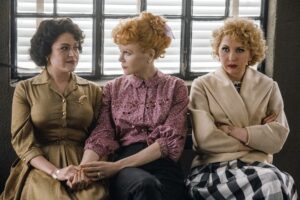
When it comes to classic television, few shows have left as lasting a mark as I Love Lucy. The groundbreaking sitcom not only entertained audiences but also changed the landscape of television forever. With the release of Being the Ricardos, a film that dives deep into the lives of Lucille Ball and Desi Arnaz, audiences are given a fresh perspective on this beloved couple. The cast of Being the Ricardos had their own revelations during research for the film, uncovering surprising facts that highlighted the complexities of Lucy and Desi’s relationship and the challenges they faced.
In this article, we’ll explore these unexpected discoveries and their implications on the film, giving you a unique insight into both the iconic show and its enduring legacy.
The Legacy of I Love Lucy

A Revolutionary Sitcom
When I Love Lucy premiered in 1951, it broke new ground in television. Not only did it feature a female lead in a comedic role, but it also tackled social issues like gender roles and race in ways that were unprecedented for the time. The show’s unique blend of slapstick comedy and heartfelt moments resonated with audiences, making it a cultural phenomenon.
The Power Couple: Lucille Ball and Desi Arnaz
The on-screen chemistry between Lucille Ball and Desi Arnaz captivated viewers. But behind the scenes, their relationship was anything but simple. The cast of Being the Ricardos discovered that the couple’s real-life challenges were as dramatic as the storylines they portrayed on screen.
Researching the Ricardos: Surprising Discoveries
Unveiling Personal Struggles
While preparing for their roles, the cast uncovered the deep personal struggles both Lucille and Desi faced. From Lucille’s battle with pregnancy complications to Desi’s struggle with alcoholism, these challenges added layers to their characters that audiences may not have fully understood.
The Impact of Desi’s Background
Desi’s upbringing in Cuba played a significant role in shaping his character and career. The cast learned that his cultural background brought unique perspectives to the show, influencing the humor and storytelling in ways that set I Love Lucy apart from other sitcoms of its time.
Behind the Curtain: Production Challenges
The production of I Love Lucy wasn’t all laughter and fun. The cast of Being the Ricardos discovered the intense pressure and stress that came with creating a weekly television show live in front of an audience. The late-night rehearsals, creative disagreements, and the need to balance personal lives with professional commitments created a tumultuous atmosphere that sometimes spilled into their performances.
The Role of the Studio Audience
The immediate feedback from the live studio audience was a double-edged sword. While it provided a lively atmosphere and helped refine performances, the pressure to entertain was immense. The cast of Being the Ricardos found it fascinating how this dynamic shaped the show’s comedic timing and overall energy.
Lucille Ball: A Trailblazer for Women

Breaking Stereotypes
Lucille Ball was not just a star; she was a pioneer for women in entertainment. The research revealed how her determination and vision helped pave the way for future female comedians and writers. The cast was inspired by her ability to navigate a male-dominated industry, ultimately leading to her founding her own production company, Desilu Productions.
The Reality Behind the Glamour
While Lucy portrayed the lovable housewife on screen, the research showed that she often felt the weight of societal expectations. The cast learned about her struggles with self-doubt and the desire to be taken seriously as a businesswoman and creative force, rather than just a pretty face on a sitcom.
Desi Arnaz: The Unsung Hero
Cultural Ambassador
Desi Arnaz’s influence extended beyond just his role as Lucy’s husband. The cast discovered that he was a cultural ambassador, introducing Latin music and culture to mainstream America. His efforts to integrate these elements into I Love Lucy showcased his commitment to authenticity and representation.
Balancing Act: Fame and Family
Despite his success, Desi faced the challenge of balancing his burgeoning career with family life. The cast of Being the Ricardos was surprised to learn about the toll that fame took on his personal relationships, particularly with Lucille and their children.
The Intersection of Fiction and Reality
The Story Behind the Show
One of the most intriguing aspects that emerged during research was how much of I Love Lucy was drawn from the real lives of Lucy and Desi. The show often mirrored their personal challenges, including struggles with marriage and parenting. The cast learned that many episodes were inspired by actual events, making the humor all the more relatable.
Writing the Ricardos: Collaboration and Creativity
The collaboration between the writers and the stars was critical to the show’s success. The cast of Being the Ricardos discovered that Lucille and Desi were heavily involved in the writing process, offering insights that ensured the storylines were authentic and engaging.
Cinematic Choices in Being the Ricardos
Capturing the Essence of the Era
The film Being the Ricardos aimed to capture the essence of the 1950s television landscape. The cast worked hard to recreate the set designs, costumes, and filming techniques of the time. This attention to detail was essential in conveying the nostalgia that surrounds I Love Lucy.
Balancing Comedy with Drama
One of the main challenges for the cast was balancing the comedic elements of I Love Lucy with the drama of Lucille and Desi’s real lives. The cast learned the importance of maintaining this balance to honor the legacy of the original show while providing a fresh perspective on its creators.
Conclusion: The Enduring Legacy of I Love Lucy
The journey of discovering the truth behind I Love Lucy revealed much about the lives of Lucille Ball and Desi Arnaz. The cast of Being the Ricardos emerged with a deeper understanding of the complexities of their relationship, the challenges they faced, and the impact they had on television history. As we celebrate the legacy of I Love Lucy, it’s clear that its influence continues to resonate, reminding us of the power of love, laughter, and the enduring strength of human connection.